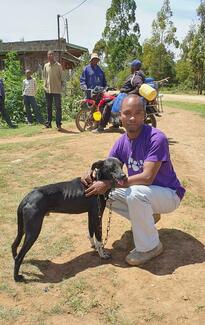
Description of your work
Laikipia Rabies Vaccination Campaign has been in existence for the last 8 years and has cumulatively vaccinated over 90,000 dogs and we vaccinated over 16000 dogs in 2022 alone. We work in the rural pastoralist communities of Laikipia and our approach is to educate dog owners on caring for their herding dogs, educating them on rabies control and the importance of rabies vaccination. Ultimately we provide free annual vaccination for dog owners who either have no access to animal health care or cannot afford annual rabies shots for their dogs. The dogs here are mostly not pets but rather herding dogs whose main purpose is to protect livestock from wildlife like hyaenas and leopards by alerting the owner of a wild carnivore nearby hence by protecting these dogs from rabies we are preventing human-wildlife conflict and protecting
wildlife too.
Impact in numbers
People educated in 2022 - close to 5000
People educated since the program began 8 years ago - over 100,000
Animals Vaccinated in 2022 - Over 16,000 dogs
Animals vaccinated since the program began - Over 90,000 dogs
Animals to be vaccinated in 2023 - 20,000 dogs
600 neutering planned for 2023 targeting stray dogs in rural shopping
centers.
Impact (description)
We are supported every day by community leaders from Elders and Chiefs to the County Governor who have helped the project find resources and get received well in the villages every year. Over the years dog bite incidence in Laikipia (project area) has declined from close to 200 in 2016 to less than 20 per year in 2022, this is mainly due to animal welfare and dog handling training that we have strived to have many dog owners understand. The last case of human rabies in Laikipia was in 2018, before the program began Laikipia had an average of 7 human rabies cases per year (actually our program began after a staff died of rabies and it shook the institution greatly).
Share a personal experience
Around 2015, a staff of the Mpala research center got bitten by a rabid dog and because they had no much information on steps to take, he did not go to a hospital and sadly died 3 weeks later. This triggered some colleagues working at the research center to begin community education in the surrounding areas on what to do in case of a dog bite and how to protect their dogs from rabies and with this initiative the rabies vaccination and rabies education campaign was born. Over the years it was realized that wildlife too suffer a lot when there is an outbreak of rabies and being a wildlife research center the program received even more support from conservationist seeking to protect the endangered African Wild Dogs from rabies (which they can get from domestic dogs)
Partners
Laikipia County Government - Veterinary department
Kenya National Government - Zoonotic Disease Unit
Kenya National Government - One Health Department
Kenya National Government - Directorate of Veterinary Services and the
National Vaccines Institute
Kenya Society for Protection and Care of Animals - KSPCA (animal welfare trust)
Samburu - Laikipia Wild dog project - Community wildlife coexistence training
Kenya Wildlife Services
*Information adapted from nomination form submitted.
